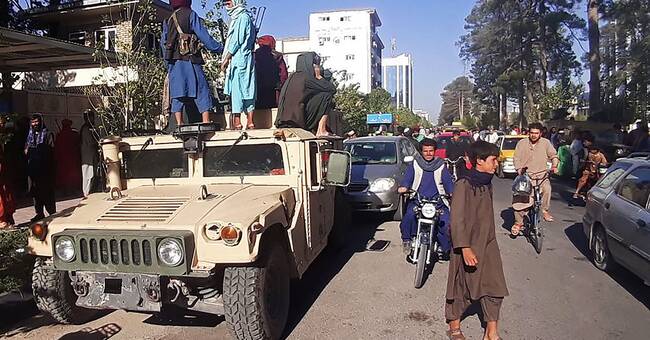Weak Afghan Army
The Afghan security forces are numerically superior, but the Afghan army has had major problems when the United States leaves the country.
- The most crucial thing is that you do not have any flight support.
When the United States withdrew, the maintenance of the plan disappeared.
The Taliban have also specifically had pilots as targets and killed them in attacks, says Helene Lackenbauer, Afghanistan expert at the Swedish Defense Research Agency (FOI).
At the same time, morale among Afghan government soldiers has bottomed out.
Soldiers have deserted and fled as the Taliban approached.
In several cities, the government and military have had only a few roadblocks and buildings, making them easy for the Taliban to conquer.
- The Afghan security forces, like the state, suffer greatly from corruption, inefficiency and difficult bureaucracy, says Afghanistan expert Anders Fänge.
2. Support from Pakistan
Neighboring Pakistan has been accused by both the United States and Kabul of supporting the Taliban.
Pakistan denies, but the country's support has been important for the Taliban's offensive, according to Anders Fänge.
- Pakistan has given the Taliban leadership protection and allowed them to be in Pakistan.
They probably also helped the Taliban with military equipment, says Fänge.
3. New strategy in the north
Northern Afghanistan has historically been the Taliban's weak point.
In the 1990s, there was the resistance movement Northern Alliance and a strong popular support for the Taliban.
In the north, Tajiks and Uzbeks are the largest ethnic groups, while the Taliban mainly consist of the country's largest ethnic group, Pashtuns.
In the run-up to the US withdrawal, the Taliban have had plenty of time to change their strategy in the north.
- They have concentrated on stopping popular mobilization in the north, says Fänge.
The fact that the Taliban have allowed more ethnic groups into the movement has paved the way for their rapid advancement.
- When they conquered areas in the north in the 1990s, they often installed Pashtun governors.
This time, they have worked to bring in other minorities, such as Uzbeks, Tajiks and Hazaras, says Fänge.
4. Warlords on dekis
The militias and warlords who have fought the Taliban in the past are less organized and equipped than before.
- President Ashraf Ghani has opposed the warlords who formed the Northern Alliance, says Helene Lackenbauer.
- There are mutual conflicts between the warlords.
The president has not done what he could to unite them.
The question is also how big their militias are at the moment.
5. War-weary population
The Taliban have successfully lowered the resistance by spreading propaganda that their troops are significantly larger than is the case.
The strength and will of the Afghan people is low when it comes to resisting the Taliban.
- It is a hardened people who have been at war since 1979 when the Soviet Union invaded.
Many poor people have nowhere to flee and have no choice but to accept the conditions, says Helene Lackenbauer.

